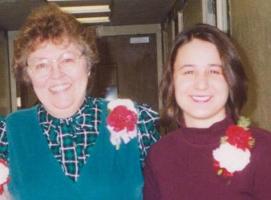The year was 1994. Newly married, I had nothing to offer the job world but a degree in History and a winning smile. By that point, I had figured out that I liked working with kids and was pretty good at it. As I scanned the local job ads, I saw that a Montessori school in Niles, IL was advertising for an assistant.
“Hmm, Montessori,” I thought. “Isn’t that just for gifted kids?” Other than that, I knew nothing about Montessori. But I needed a job, so I called and set up an interview. When I went to the school, the director was friendly and seemed to like me.
But what really got my attention was the classrooms – I had never seen anything like it. Open shelves, rugs on the floor, kids working quietly and independently. So this was Montessori! And, the director assured me with a laugh, it was for any child, not just gifted ones.
I started work immediately in the new preschool (3-6) classroom that was just opening up. I watched the directress present the math materials, show children how to scrub a tire, and carry pink cubes to a rug one at a time. When she gave one child an eggbeater to make bubbles in a bowl, I couldn’t believe it. How was she able to think of all these creative activities? It wasn’t until later that I realized that Montessori teachers had “albums” full of “presentations”; they weren’t coming up with ideas all on their own.
In her office, the director had several shelves full of Montessori books and magazines. She told me to feel free to read anything I found interesting, so every day at my lunch hour, I went and grabbed some reading material. The first things I read were back issues of the North American Montessori Association’s Teacher Journal. It was scholarly, but I devoured every word.
Worlds opened up to me as I read – ideas I had never heard before, about respecting a child’s mind, following the child’s lead, and the teacher’s primary role as a guide, not an autocrat. It was so different from my own schooling experience, which was frequently miserable; it called out to me because I knew, just knew, that this was how children were supposed to be educated.
After working as a 3-6 assistant for several years (and soaking up every piece of knowledge I could about Montessori), I decided to take the 3-6 training. I applied to Midwest Montessori Teacher Training Center in Evanston, IL and was accepted. Just a month or two after acceptance, I found out I was pregnant. Reluctantly, I called an dropped out of the program. While I could have finished the training before having the baby, I wouldn’t have been able to complete the internship because I planned on staying home the first few years.
Then, the unthinkable happened. Our daughter, Sarah, was stillborn when I was 6 ½ months pregnant. As we dealt with our grief, I began another school year as a 3-6 assistant. The directress I worked with was very understanding and kind during that year, which was especially hard for me because she gave birth to a baby girl a few months after I had been due. Sweetly, she gave her daughter the middle name “Sarah” in honor of my daughter and of our strong friendship.
 That spring, I decided to apply for the Montessori training again, but this time for elementary. During that year, I had learned about the 6-9 program and instinctively knew that age group was a better fit for me. I began the training in the summer of 1997, and everything clicked. Needing a job (my current school didn’t have an elementary program), I asked our trainer, Sister Mary, if she knew of any job openings. She said, yes, that she herself needed an intern for the coming school year.
That spring, I decided to apply for the Montessori training again, but this time for elementary. During that year, I had learned about the 6-9 program and instinctively knew that age group was a better fit for me. I began the training in the summer of 1997, and everything clicked. Needing a job (my current school didn’t have an elementary program), I asked our trainer, Sister Mary, if she knew of any job openings. She said, yes, that she herself needed an intern for the coming school year.
So in the fall of 1997 I started teaching at the Midwest Montessori Training Center School under Sister Mary. We were a “model school”, a place where interns and teachers could come to see the perfect classroom setup and correct presentations. This added an extra layer of difficulty to the already challenging situation of mastering the 6-9 curriculum and presentations, but I learned an enormous amount during that year. (Photo: Sister Mary & me. I think we’re wearing corsages because it was Teacher Appreciation Day).
Think of how easily I could have missed out on a life devoted to Montessori. Think of all the “ifs”: if that school hadn’t been offering a job at that time, if they hadn’t hired me, if I had never seen that job ad – I would have never found Montessori.
Now that I can look back on my early Montessori years, I can see just how much those chance circumstances affected my life. But it really wasn’t chance at all – God was leading me, even though I had no idea what awaited when I applied for that first job – and now, my life is forever changed because of Maria Montessori and her educational method.
But enough about me – how did you find Montessori? Or, did Montessori find you?

